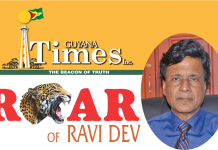New and Collected Poems by Ian McDonald, part two
(Extract of an interview with Dr. Ian McDonald, Georgetown, Guyana, March 2019.
McDonald has published eight collections of poetry, one award-winning novel, one award-winning play, three non-fiction works, and has written over 1,500 articles. He has won the Guyana Prize for Literature on three occasions, all in the poetry category.
Here, he continues to talk about his latest poetry book, ‘New and Collected Poems’ which runs into 447 pages. His most recent publication is ‘An Abounding Joy: Essays on Sport’ is 558 pages long.)
IM …..in this latest phrase of my life, I have written a lot of poetry, in fact, when I look back, I probably wrote more poetry in that time span than in any other similar time span in the rest of my life. This book does go back all the way.
PP So let’s talk beginnings….
IM Poetry is in my genes. Remember my great, great, great grandfather was a poet back in England and published poetry in the 19th c., my great uncle was a poet and published a book of poems out of Antigua, my grandmother, Hilda McDonald, my father’s mother, published two books of verse out of Antigua. So I always say in me there is a poetry gene that emerged in me as well. So I have always known about poetry, my parents had a very good library including lots of books on poetry…
PP Important influence – the library.
IM I remember reading poets like Tennyson, John Keats, and Shelly and Wordsworth when I was quite young.
Very formative, was my English Teacher at Queen’s Royal College in Trinidad. A man I can remember now – I wrote a poem about him called ‘John Hodge’ – he inculcated a love for poetry in me, not just text book poetry but poetry from all over the world, from poets we weren’t studying at school…he said that we must remember that there is a lot of wonderful poetry well beyond our syllabus. He was very important in my life.
Then I have a distinct memory of someone putting in my hand a very small collection, almost a pamphlet of poems written by a young West Indian called Derek Walcott, and it was his first collection when he was about 18 or 19 and it was called very simply ‘Twenty-five Poems’ by Derek Walcott….I remember reading it and, Petamber, I am going back more 70 years, I remember reading it and saying this poetry is so good and it is affecting me so much, and it was by a West Indian, not an Englishman, or a Frenchman in translation, or anyone else, it was by a West Indian. A West Indian writing poetry like – this is marvelous. And I think, from then I realize why not, why not try writing poetry myself.
PP Your poetry has evolved, leaning towards free verse/blank verse…
IM I’d go beyond that. Most of my new poems – it is a strange thing – they have emerged, they almost write themselves; the way they emerged and I write them down literally without punctuation. When I discuss them with my editor, then punctuation is inserted. The origin manuscript of ‘River Dancer’ didn’t have punctuation at all – the ‘River Dancer’ in this collection has some punctuation inserted when it was edited. But basically, these new poems I’m talking about have emerged with a minimum of grammatical punctuation; they have emerged as out of my mind, as it were, unto the page even without capitals etc…so in some ways, these most recent poems are different than what I use to write.
PP Your poetry has evolved
IM Definitely
PP Now not so much with form but with the experimentation with words – playing with words
IM That is true. I think you use a good word – my poetry is evolving – but yet the themes remain the same – I still find myself writing about the beauty of nature, I still find myself writing about personalities – characters, people; ‘Mercy Ward’ is a series of portraits of people, even now the new poems when you read them they are about portraits of people…
PP ‘People of Guyana’…
IM Now that you’ve mentioned that – a little booklet I brought out with my good friend, Peter Jailall, called ‘People of Guyana’ – my poems in there go back quite some years but some are quite new and they all about people.
So in some ways although my poetry has evolved the themes remain the same and I suppose that is true of all poetry after all the themes of life are the same for us…
PP Love, life, death, ageing
IM Birth, joy, youth, grief – these themes will never change.
PP Now more than ever, you’re writing about ageing
IM Yes, as you age, you write about ageing…
PP You’re going through that process, dealing with it
IM A lot to do with ageing is not only what’s happening to you but also what is going on around you – people and friends around you who age and die and disappear, all of which are themes for poetry
PP Poetry, poetry, poetry, what is this thing called poetry…
IM A lot of people find it difficult to see where poetry fits in their life. They can understand prose, accounts of life, sport, politics, war and peace, and everything else but when is come to poetry, they don’t see the relevance but that’s so untrue because nearly every situation in life and every emotion that you have, poetry illustrates it…
I cannot imagine living life without poetry …..
Responses to this author please telephone 226-0065 of email: [email protected]
What’s happening:
Coming soon: A new book by Ameena Gafoor: ‘The Evolution of Writing in English By and About East Indians of Guyana, 1838 – 2018’.
Poem
Leave Exam Fear
Listen o my dear leave exam fear
Work hard and feel confident
Give it your best and God will see the rest
In any situation never leave your cheer
No one does best always in exam
Mistakes do occur in reality realm
They give us training to always do better
Never loose your heart and don’t shatter
Learn from your mistakes and improvise
You will thus become more and more wise
People will admire and success will come near
Listen o my dear leave exam fear
Work hard and feel confident
Give it your best and God will see the rest
In any situation never leave your cheer
Nothing is certain in ever changing life
Only good exams will never suffice
Problems don’t declare their sudden arrival
Strength is needed for a peaceful survival
Practical learning is equally essential
It brings out your real potential
Opportunities lie in so many spheres
Listen o my dear leave exam fear
Work hard and feel confident
Give it your best and God will see the rest
In any situation never leave your cheer
By Shishir











